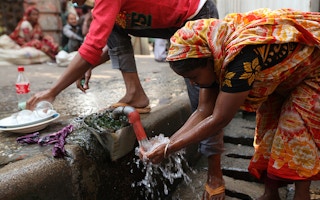Often, people living in cities in the developing world must go somewhere to fetch water from communal service points or local vendors.
This can waste hours of time traveling and standing in line. It can be unhealthy, as unsterilised water carriers are prone to contamination. It can be dangerous for the women and girls who most often handle this task. And it can be expensive buying water from private vendors: According to the charity WaterAid, families can spend up to half of their income on water bought on the black market.
Grégoire Landel thinks technology can help fix this. His Paris-based company, CityTaps, wants to bring running water to every urban home. It’s a problem he began thinking about while living in Uganda, where he realised that not everyone living on his street had access to running water. “It was a mystery that needed understanding,” Landel recalls, “because it’s abhorrent situation to be in.”
Landel is presenting CityTaps this week at the New Cities Summit outside of Seoul, South Korea. He’s one of a class of “Global Urban Innovators” showcasing entrepreneurs who are using technology to tackle urban challenges around the world.
As Landel sees it, the underlying economics of water service in developing cities is broken. Utility companies face a double obstacle in achieving financial sustainability. On one hand, their service is subjected to pricing set by governments. On the other, unpaid and late bills lead to chronic cash-flow problems.
“
We need utilities to break even or make money so that in the long run, they are able to serve everyone, rich and poor.
Grégoire Landel, CityTaps
According to Landel, who conducted an analysis of financial statements provided by some companies, chasing payments constitutes 20 pervcent of their operating costs. “So it’s hugely expensive and not particularly efficient,” he explains.
This makes water companies extremely risk-averse and reluctant to extend their services to neighbourhoods where households are perceived to be financially unstable. In doing so, they’re missing out on an estimated USD 20 billion in revenue, Landel says.
[See: How Durban set the global standard for providing water and sanitation for the poor]
CityTaps aims to help utilities mitigate these risks — and encourage them to serve more urban dwellers. To smooth out bumps in cash flow, Landel’s company uses a prepaid billing system. And to optimise the water delivery system, CityTaps deploys “smart” water meters that allow utilities to run more efficiently.
“It’s not very complicated to provide running water to people,” says Landel, a Franco-American engineer who has spent the last decade exploring the connection between water and finance in developing countries. “Technologically speaking, it’s very simple. But what’s really complicated is the economics of it.”
In Niamey, the capital city of Niger, CityTaps partnered with a local subsidiary of the French transnational company Veolia to install smart meters in 20 homes. The meters are connected to a wireless network and analyse consumption patterns in real time. This produces data that the utility can use to detect variations in water usage or leaks, and respond to them.
The smart meters come coupled with prepaid billing. This eliminates problems linked to late payments. It also gives customers greater control over their consumption and finances, since they’re free to renew the service or not when their pre-paid water credit expires. Payments can be made via mobile money, and are recorded by the smart meter, which can then reactivate the water service instantly.
[See: African cities look for ‘leapfrog’ water solutions with launch of AfriAlliance]
Customers who are using CityTaps’s smart meters in Niamey were able to slash their water bills to a fraction of what they were previously. Landel now wants to scale the service up to other countries in sub-Saharan Africa, as well as Latin America and South Asia, with the ambitious goal of installing 10 million smart meters in 10 years.
But convincing financial backers won’t be easy. The international development community has typically supported fast and low-cost water delivery solutions, such as standpipes — vertical pipes fitted with a tap and connected to a water supply, used for communal water delivery. Landel, on the other hand, insists that all households should have access to running water in their homes.
“We need utilities to break even or make money,” he says, “so that in the long run, they are able to serve everyone, rich and poor.”
This story was published with permission from Citiscope, a nonprofit news outlet that covers innovations in cities around the world. More at Citiscope.org.










